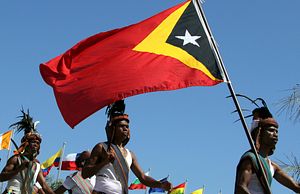Timor-Leste’s prime minister offered his resignation Tuesday after the budget failed to pass in Parliament.
Prime Minister Taur Matan Ruak said he would continue to carry out his duties until the president approved his resignation. “We also cannot leave our country without direction like a car without a driver,” he told reporters at the presidential office.
He said the decision on whether to announce another election or call political parties to form a new government would rest with President Francisco Guterres Lu Olo.
The coalition government led by Matan Ruak has been divided because the budget for 2020 has been blocked by the opposition and government parties.
The president said on February 10 that fresh elections were the final recourse and asked parties with parliament seats to move politically to provide a good solution to the impasse.
In response to that request, the National Congress for Timorese Reconstruction party led by Kay Rala Xanana Gusmao formed a coalition with five other parties to form a new government.
“We believe that these 34 seats will guarantee the stability of the new government,” Gusmao said Saturday.
The signing process was attended by 1996 Nobel Peace Prize laureate Jose Ramos Horta, the strongest current candidate to become prime minister.
Gusmao said if the impasse is left alone, it will bring great destruction to the country’s economy, making small communities vulnerable.
If the coalition agreement results in the formation of a new government, the Revolutionary Front for an Independent Timor-Leste party and the Popular Liberation Party would be in the rumored opposition. They would hold 31 seats in the parliament.
The coalition would continue the past government’s 2030 strategic plan for development. It would plan to give full attention to people in rural areas to improve their lives, guarantee national stability as a determinant factor for national development, and continue negotiations of land and sea boundaries with Indonesia.
President Lu Olo on Monday questioned if the new coalition would renominate nine cabinet members rejected since June 2018.
The coalition did not comment on those nine candidates, but Gusmao previously stated the party would not replace people whose inaugurations are still pending, citing the principles and credibility of his party.
By Raimundos Oki of The Associated Press.

































